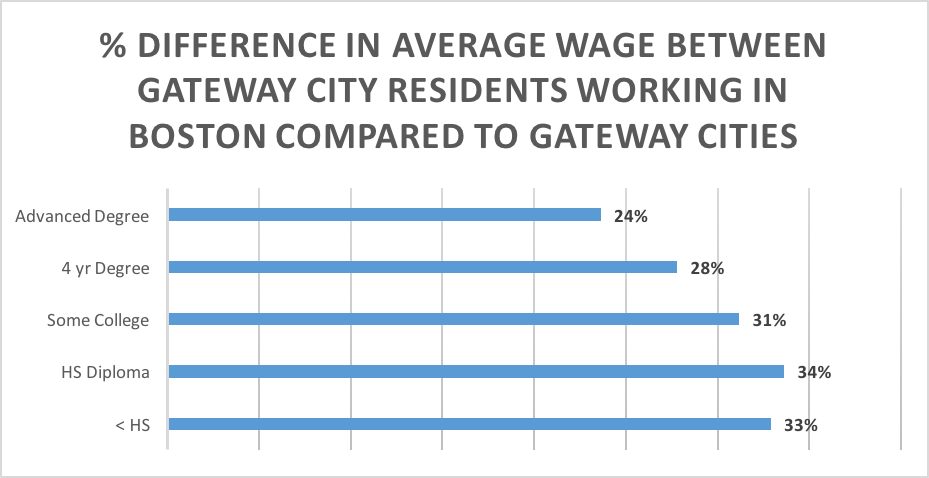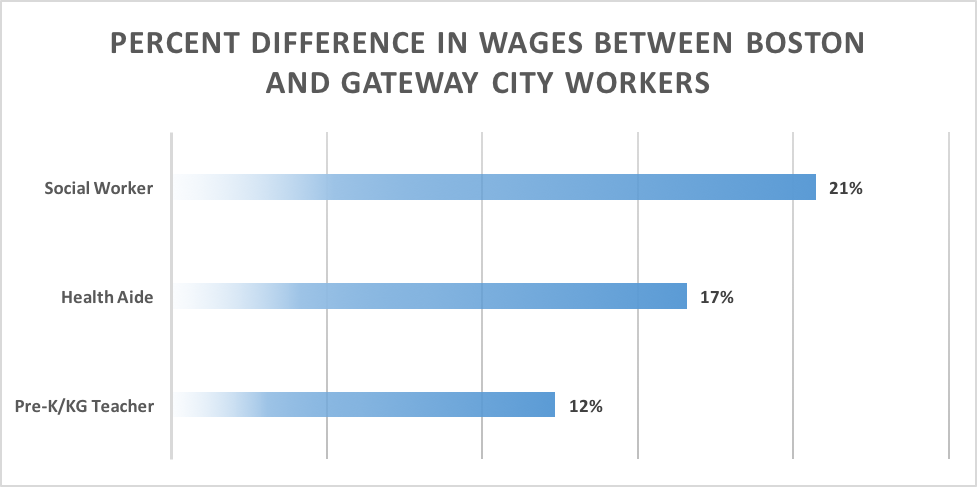A startling percentage of households migrating from Boston to the Gateway Cities are low-income and transit-dependent. For these residents, finding living wage work may now hinge on whether they can make the commute back to Boston.
Data from the American Community Survey show that Gateway City residents who are able to find and get to jobs in the Boston area earn significantly higher salaries that those with similar education levels who work within their city of residence.


On average, Gateway City workers willing and able to commute into Boston for their jobs can expect a salary 30 percent higher than their locally-employed peers. The bump is especially large for those with less education.
While controlling for education may not give us a complete picture of all the factors that could skew pay, we also observe this trend when looking at individual jobs. For example, a Gateway City resident performing social work in Boston earns 20 percent more than a Gateway City resident doing social work for an employer in their own community.


Currently, the high cost of commuting many miles to Boston from a Gateway City can be prohibitive in terms of both time and money, dissuading workers from attempting to get to these higher-wage employment opportunities. For a health aide living in an outlying Gateway City like Fitchburg, a monthly rail pass can cost up to $363. Fares would eat up nearly all of the wage premium gained by commuting to Boston. (Driving would impose an even larger cost. Given 2017’s standard mileage rates for drivers, a single roundtrip from Fitchburg to Boston costs more than $50 a day without factoring in parking, tolls and time lost in traffic).
More thorough analysis factoring how wage gains may lead to reductions in public benefits, particularly costly healthcare subsidies, would likely provide a strong rationale for subsidizing fares for low-income workers looking to access higher wage work.
But we must also factor in the economic development consequences of siphoning labor out of Gateway City regions. An ideal scenario would be a transit system that provide the excess supply of low-skill workers in Gateway Cities with connections to higher wage work in Boston, injecting the wage premium they earn by commuting into the local economy, while, at the same time, increasing Gateway Cities’ access to a pool of higher-skill workers in Boston.
NOTE: The PUMA codes used for Boston are 505 (Arlington and Belmont), 506 (Cambridge), 508 (Somerville), 509 (Medford), 3301 (Allston, Brighton, and Fenway), 3302 (Back Bay, Beacon Hill, Charlestown, East Boston, Central, and South End), 3303 (Dorchester and South Boston), 3304 (Mattapan and Roxbury), 3305 (Jamaica Plain, Hyde Park, Roslindale, and West Roxbury), and 3306 (Chelsea). The Gateway City PUMA codes are 300 (Worcester), 301 (Fitchburg), 400 (Pittsfield), 502 (Lowell), 701 (Lawrence and Haverhill), 1900 (Springfield), 1901 (Holyoke), 4302 (Fall River), 4500 (New Bedford), 4901 (Brockton).
